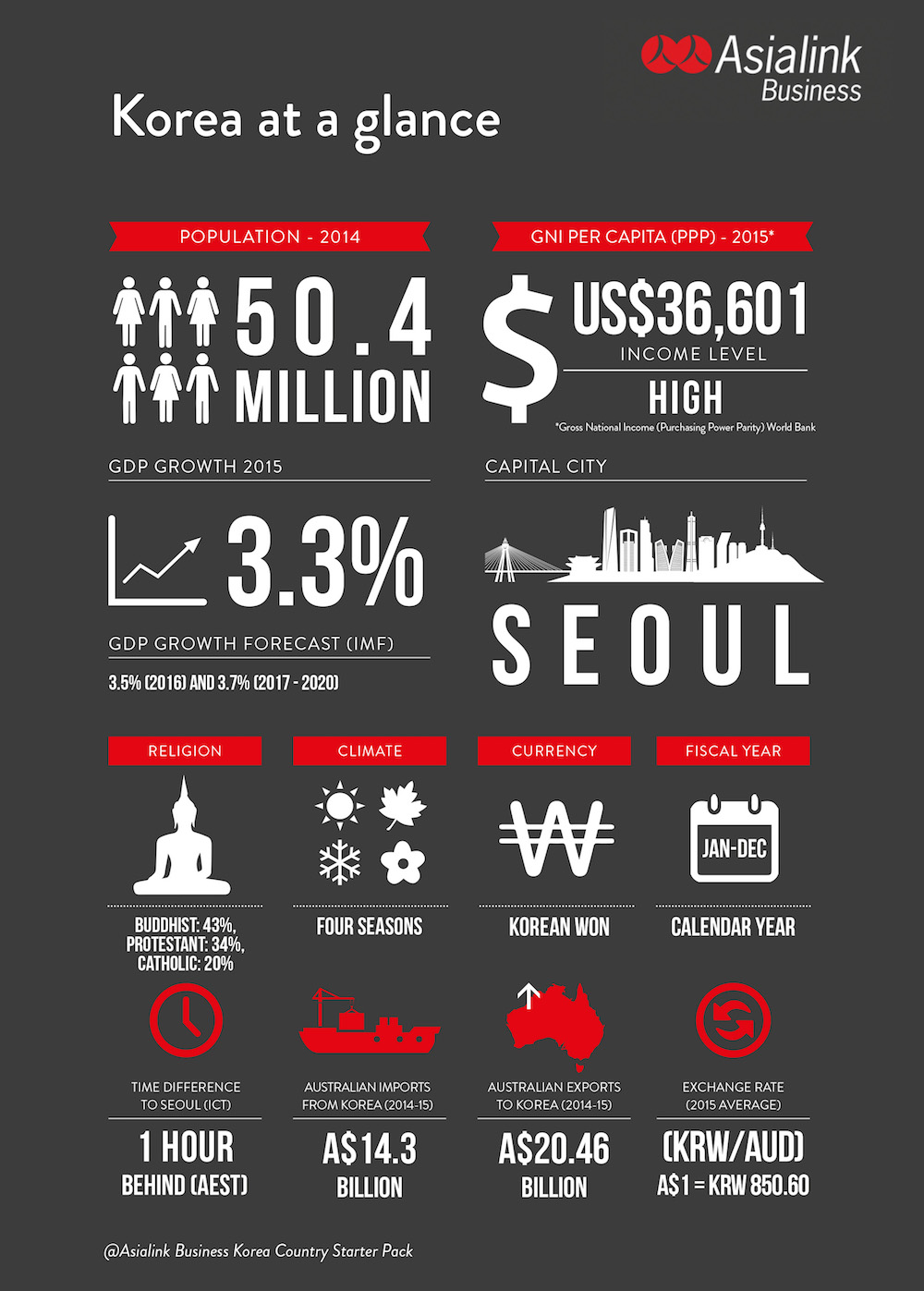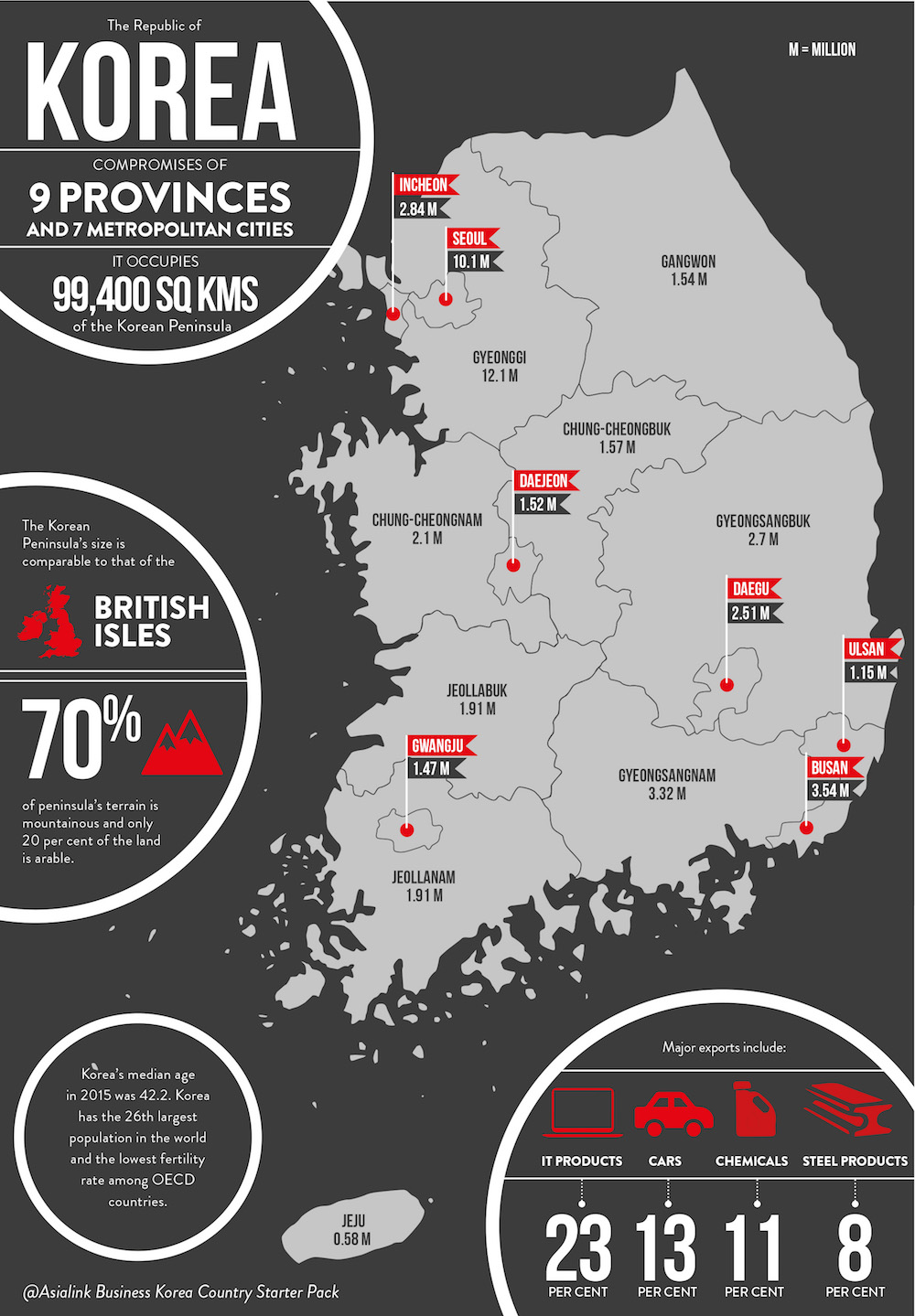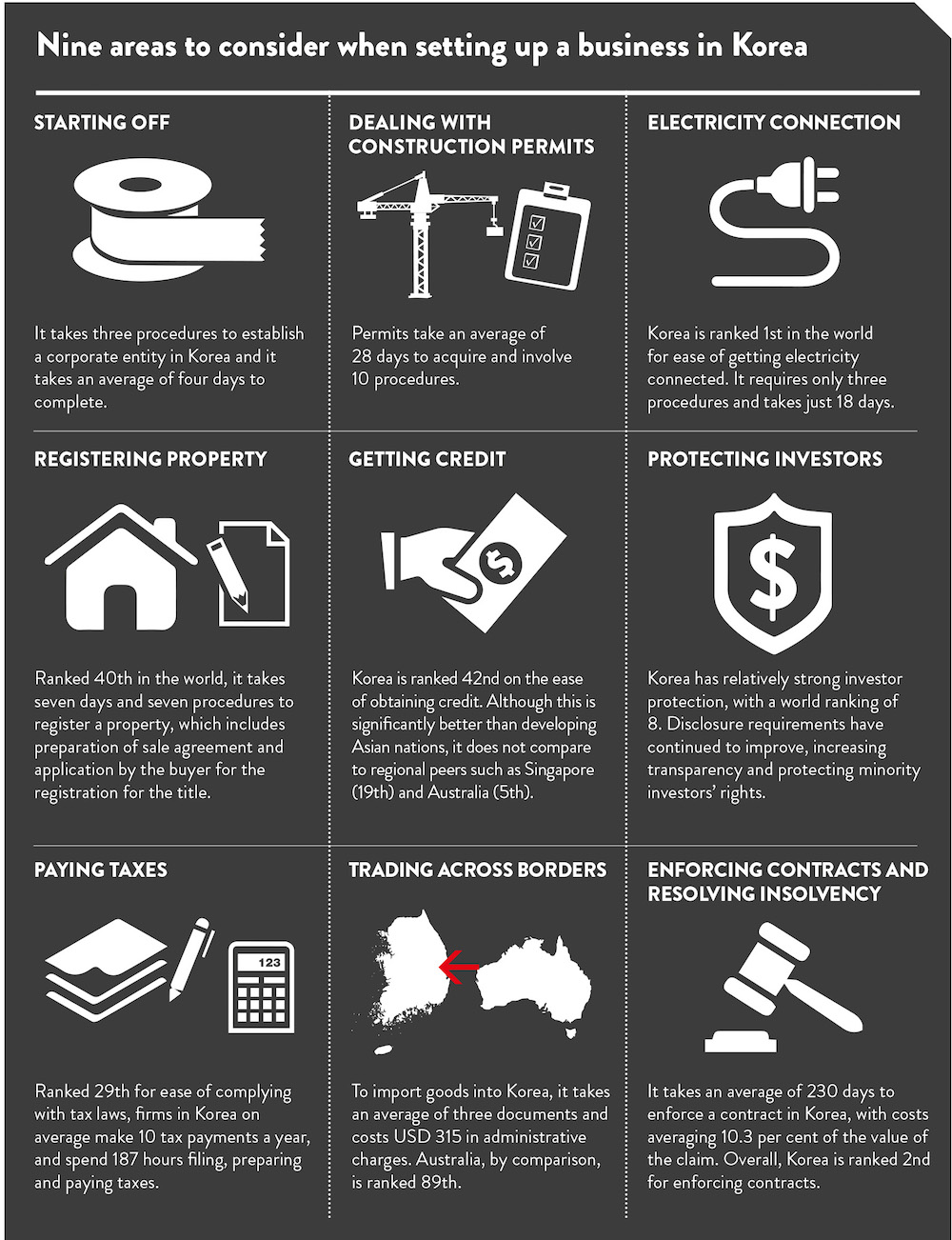Doing Business in the Republic of Korea
The Korea-Australia Free Trade Agreement (KAFTA), which came into force in December 2014, promises to open up even more opportunities for Australian business.
The Korea-Australia Free Trade Agreement (KAFTA), which came into force in December 2014, promises to open up even more opportunities for Australian business.
The Republic of Korea (ROK), commonly known as Korea and formerly known as South Korea, is the fourth-largest economy in Asia and the 13th largest in the world. It is an innovative, free-market economy with a highly educated workforce and democratic government.
Korea is a dynamic country with many opportunities for Australian businesses. It has an advanced manufacturing sector and is home to iconic and world leading brands such as Samsung, LG, Hyundai and Kia. The nation boasts an affluent, tech savvy population with a well-educated, highly skilled workforce.
Korea is an optimal location for doing business with the world's second and third-largest economies (China and Japan) and engaging the overall Asian market. The Korea-Australia Free Trade Agreement (KAFTA), which came into force in December 2014, promises to open up even more opportunities for Australian business.
KAFTA is one of the most comprehensive trade deals completed by Australia with any nation, delivering big improvements in market access and tariff elimination or reduction for exporters of goods and services. The agreement secures Australia’s competitive position in the Korean market.

Want to learn more? Download the Korea Country Starter Pack
Korea is an innovative, free-market economy with a highly educated workforce and democratic government.
The Republic of Korea (ROK), commonly known as Korea and formerly known as South Korea, is the fourth-largest economy in Asia and the 13th largest in the world. It is an innovative, free-market economy with a highly educated workforce and democratic government.
Korea is an optimal location for doing business with the world's second and third-largest economies (China and Japan) and engaging the overall Asian market. The Korea-Australia Free Trade Agreement (KAFTA), which came into force in December 2014, promises to open up even more opportunities for Australian business.

There are a number of industries that Australian businesses can target and take advantage of.
Opportunities exist for Australian businesses in food and agricultural, such as wine, nuts, dairy, meat and fresh fruits. Korea is highly dependent on food imports, and Australian businesses are well regarded in Korea as suppliers of high quality and safe food products. The Korean food market is also rapidly evolving, driven by changing consumer tastes and expanding distribution channels.
Korea’s rapidly ageing population needs increased financial security from personal investments. Consumer expectations are challenging the traditional investment mindset and are putting pressure on Korean banks and funds to deliver higher returns. This is driving greater interest by institutions in higher yield alternative products, such as offshore investment services, and partnerships with foreign firms. Infrastructure and real estate are now two areas of particular interest for many Korean firms.Education
Korea is a stable and well-established market for Australian education providers. It is the fourth-largest source country for foreign students in Australia after China, India and Vietnam. Australia is an attractive destination for Korean university students trying to improve their English language skills and to build work experience. Opportunities for Australian institutions exist in higher education, vocational education and training (VET), schooling and intensive English courses.
Korea’s population is ageing rapidly, faster than most other OECD countries. This is the result of increased life expectancy and one of the lowest fertility rates in the OECD. Opportunities for Australia exist in areas including health and aged care services, pharmaceuticals, and advanced medical equipment.

The free trade agreement will deliver new market opportunities for Australian service suppliers, particularly in accounting, legal and audio visual services. For example, within two years of KAFTA coming into force, Australian law firms will be permitted to enter into cooperative agreements with Korean law firms, and within five years, establish joint ventures and hire local lawyers.
Koreans are among the world’s biggest users of fast broadband and mobile phones. Korea was the first country to build a national, high-speed fibre broadband network (more than ten years ago), and has a mobile penetration rate of 1.1 mobile phones per person - which means there are more mobile phone accounts than people. Korea has strong ICT hardware manufacturing capabilities that complement Australia’s software capabilities.
Detailed information on opportunities for Australian businesses in Korea is available in the Asialink Business Korea Country Starter Pack.
The Korea Australia Free Trade Agreement (KAFTA) came into force on 12 December 2014.
The Korea Australia Free Trade Agreement (KAFTA) came into force on 12 December 2014, after being signed by the two governments in April of that year. KAFTA was Australia's first free trade agreement to be concluded with a major trading partner in North Asia.
KAFTA is one of the most comprehensive trade deals completed by Australia with any nation, delivering big improvements in market access and tariff elimination or reduction for exporters of goods and services. It also substantially improves investment protections for Australians doing business with Korea.
The agreement secures Australia’s competitive position in the Korean market, where some competitors have already been enjoying preferential access. Specifically, the agreement helps level the playing field for Australian exporters competing with those from the US, New Zealand, the EU, Chile, and the Association of South East Asian Nations (ASEAN), who benefit from similar trade deals with Korea.
Benefits of KAFTA for Australian businesses include:
More detailed information on the relationship between Korea and Australia, free trade zones and special economic zones is available in the Asialink Business Korea Country Starter Pack.
Do your market research – lots of it.

Before doing business in Korea, you should:
Have a detailed financial plan that considers:
More detailed information on starting a business in Korea, registration and financial requirements and more and can be found in the Asialink Business Korea Country Starter Pack.
Investing in relationships is critical to succeeding in Korea.
Investing in relationships is critical to succeeding in Korea. The strength of business relationships can determine many aspects of commercial life, including access to credit, procurement, and contracting. Investing in business relationships often involves large amounts of face-to-face time with a person of similar age and status, with a strong emphasis on loyalty and trustworthiness.
Australian businesses should also explicitly consider the impact of age, gender, education, and marital status on the formation of personal and commercial relationships in Korea. For example, younger people are often excluded from decision making processes, therefore are expected to defer in language and attitude to older people.
Nurture relationships – Relationships in Korea are more trust oriented and personal than Australians might be used to. Building a relationship will require frequent visits to Korea, almost daily communication and a lot of socialising – ensure you allow a night in Korea for each meeting planned. A conscious effort is required to nurture relationships and build trust.
Send senior executives - After your business has been set up, you should still send the most senior executive possible to Korea, in order to avoid insult and to maintain positive relationships. If the most senior person is not available, or does not have the specific expertise required for the business being conducted, you might consider giving the individual with the most knowledge of the relevant issues a high-status title.
Respect for age and status – These are very important in Korean culture, with hierarchy affecting all aspects of social interactions.
Formal introduction – Koreans prefer to do business with those they have a personal connection with. Being introduced to a prospective business associate through an intermediary is ideal for building a business relationship. The higher the social standing of the intermediary, the more successful you are likely to be at making contact with the right people. Cold calling typically has limited success.
Be consistent – Consistency in relationships is a key factor in success. Documenting agreements fully and concisely to reflect the needs and expectations of both parties will help to avoid problems later. Keep Korean partners informed of key personnel changes. There also needs to be an overlap when these changes occur, so there is continuity and consistency.
General knowledge of Korea – A basic general knowledge of Korea can assist your relationship building by creating an immediate connection with a new contact. Demonstrating what you know about the country's geography and history will please your hosts and just might make them more open in communications than they would otherwise be. Doing some travel around Korea may serve you well in this respect.
More detailed information on doing business in Korea can be found in the Asialink Business Korea Country Starter Pack.
It is crucial to understand fundamental Korean business and cultural practices.
Greeting, bowing and handshakes – Koreans bow to those senior to them both as a greeting and a show of respect. The junior person initiates the bow, bending from the waist to an angle of between 30 and 45 degrees from vertical. A less accentuated bow is returned as acknowledgment from the more senior person.
Bowing in Korea is not as pronounced as in other countries, such as Japan. Greet the highest status individual first, followed by the oldest when meeting a group of Koreans. The individual with the highest status usually enters a room first. For Australian business people, extending a simple handshake when greeting and taking leave is fine; just don't be surprised by a two-handed handshake and a bow during the course of an initial meeting.
Don't be too pushy – Korean business people are good negotiators – be patient and gentle, but firm. Also ensure you are as dignified as possible and don't push too hard. Expect a 'price war' but don't give in easily, as Koreans are persistent and admire this quality in others.
Geopolitical sensitivities – Korea and Japan dispute the territorial sovereignty of several islands in the sea between the two countries. These islands are called Dokdo island in Korea and are known as Takeshima in Japan. Ensure you use local and appropriately referenced versions of any geographical materials (such as maps). Not observing such delicate affairs can cause insult and may lead to business relationships ceasing.
Building relationships – Building relationships is an essential part of doing business in Korea. Relationships are developed through informal social gatherings and generally involve dinner and a considerable amount of eating and drinking. Such gatherings also present the opportunity for both sides to discuss business in relaxed and friendly surroundings.
Gender equality – Although gender equality is increasing, men still dominate the Korean workplace. It is expected that businesswomen act in a refined and 'feminine' manner.
More information on business protocols and meeting etiquette in Korea can be found in the Asialink Business Korea Country Starter Pack.
Age and status – Respect for age and status are very important in Korean culture, with hierarchy affecting all aspects of social interactions. Koreans are most comfortable interacting with someone they consider their equal. Status is largely determined by someone's role in an organisation, which organisation they work for, which university they went to and their marital status.
Business cards – The exchange of business cards is an essential part of initial meetings. It allows Koreans to quickly determine their counterpart's all-important position, title and rank. While still standing, you should politely hand a business card over with two hands, and receive one in return. Do not simply drop the card into your pocket – take a few seconds to review names and titles. If you are sitting down, place it on the table in front of you for the duration of the meeting.
Korean names – Korean family names are mostly of one syllable, while given names tend to have two. The family name comes first (Kim Tae-Woo, for example). Until you are on very good terms with a Korean counterpart, it is best to use the family name preceded by an honorific (such as Mr), whether speaking directly to them or about them to another Korean. In settings that call for great respect or formality, you should use your counterpart's formal title and surname (i.e. Chairman Lee).
Dress code – Appearance is very important, and Koreans tend to dress more formally than Australians. Business attire is conservative, with an emphasis on conformity rather than individual expression. Men should wear dark-coloured business suits with ties and white shirts. Jewellery for men should be kept to a minimum – a watch and a wedding ring would be fine. Women should also dress conservatively and in subdued colours.
Korea is the most wired country in the world - an online presence is essential.
Korea is the most wired country in the world, and an online presence is essential for marketing, whatever you are selling. Product lifecycles are also much quicker than in Australia. A new product or brand's sales will explode but often decline just as precipitously.
Korean consumers pick their goods, at least partly, in order to conform to group patterns. As a result, Korea has fewer niche markets than Australia, and it can be harder to forecast which products will be adopted next.
Korean consumers are also strongly influenced by group dynamics and follow dominant trends. That's why most luxury cars sold in Korea are black, many Korean apartment blocks are made from the same blueprints and less than a half-dozen movies make up more than 90% of the country's box-office take.
Comprehensive information on sales and marketing in Korea, using agents and distributors, labelling requirements and advertising can be found in the Asialink Business Korea Country Starter Pack.
Direct selling – Koreans love convenience, and many are time poor. Major products sold door-to-door in Korea include home education materials, books, household consumer goods, cosmetics, health food, and sporting goods. By utilising direct contact with buyers and end users, direct selling can be a very cost effective alternative. But the do-it-yourself option is not an easy route to market. Many Koreans will not do business with companies that have no representation in the country, making it difficult to progress.
Franchising – A proven expansion technique for Australian brands looking to bring their goods and services to Korea. It provides access to local capital and local knowledge of consumer habits, retailing practices, and real estate opportunities. However, franchising regulations are extremely bureaucratic and the law does not distinguish between small domestic franchises and international franchise deals.
Online sales – Koreans in their 40s, 50s and even 60s make a high proportion of their purchasing decisions based on what they find on their PCs and mobile phones. To sell online in Korea you are required to set up a subsidiary or open a branch office in the country. If you want to use popular online sales markets, Korean residential status is required. It is also recommended for Australian businesses potentially selling online in Korea to review the privacy regulations, which may restrict Australian businesses managing user data on international servers.